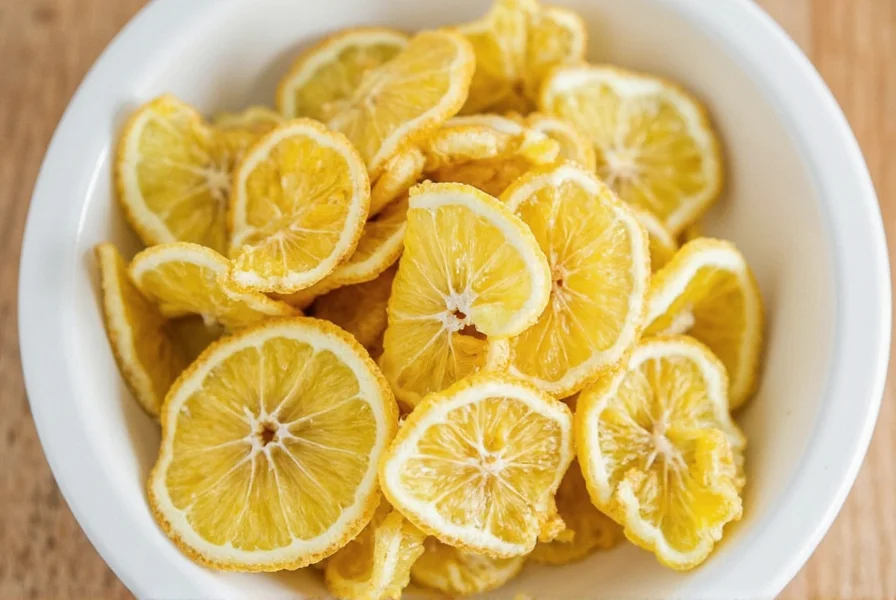Dried lemon zest is a versatile, concentrated form of lemon flavor that enhances baking, cooking, and seasoning with minimal effort. Whether you're making lemon garlic pasta, zesty cookies, or savory spice blends, this guide shows you exactly how to use it effectively—no fresh lemons required.
| Use Case | Application Method | Best Results |
|---|---|---|
| Baking | Mix 1/2 tsp per cup of flour in cake, cookie, or muffin batter | Even distribution, no clumping |
| Pasta Sauces | Stir 1 tsp into warm butter or olive oil-based sauces | Instant citrus aroma without moisture |
| Marinades | Combine with oil, garlic, and herbs for chicken or fish | Deep flavor penetration |
| Spice Blends | Add 1 tsp to taco seasoning or BBQ rubs | Long-lasting citrus notes |
| Tea Infusions | Steep 1/2 tsp in hot water with honey | Smooth, non-bitter flavor |
Why Dried Lemon Zest Beats Fresh for Most Recipes
While fresh zest delivers bright top notes, dried zest offers superior consistency and shelf stability. Here’s why it’s often the better choice:
- No Moisture Issues: Perfect for dry rubs and baked goods where water content ruins texture
- Concentrated Flavor: 1 tsp dried = 2-3 tsp fresh, reducing ingredient costs
- Year-Round Availability: No seasonal shortages or spoilage concerns
- Professional-Grade Results: Used by chefs for consistent flavor in commercial kitchens
Top 5 Pro Techniques for Maximum Impact
- Heat Activation: Add to hot oil or melted butter before incorporating into recipes to release essential oils
- Layered Application: Use 1/3 in batter and 2/3 as a finishing sprinkle for baked goods
- Texture Control: Sift through a fine mesh strainer before adding to prevent clumping
- Pairing Strategy: Combine with complementary spices (e.g., rosemary for meats, cinnamon for desserts)
- Storage-Smart Usage: Keep in small airtight containers to minimize air exposure
Common Mistakes to Avoid
- Using too much (start with 1/4 tsp per serving and adjust)
- Adding directly to cold liquids (always activate with heat first)
- Storing in clear containers (light degrades flavor compounds)
- Using for garnishes where texture matters (fresh zest is better for visual appeal)
Expert-Backed Storage Guide
Preserve potency for 12+ months with these science-backed methods:
- Container Choice: Use amber glass jars with tight-sealing lids to block UV light
- Temperature Control: Store at 50-60°F (10-15°C)—never in the refrigerator (moisture risk)
- Humidity Management: Add food-grade silica gel packets to containers
- Shelf Life Tracking: Label with "best by" date (6 months for home-dried, 12 months for commercial)
How much dried lemon zest equals fresh?
1 teaspoon of dried lemon zest equals approximately 2-3 teaspoons of fresh zest. Due to concentration from drying, use 1/3 the amount of dried zest compared to fresh. Always start with less and adjust—dried zest is potent and can’t be removed once added.
Can I substitute dried lemon zest for fresh in all recipes?
Yes, but with key considerations: Dried works best in cooked dishes, baked goods, and spice blends where texture isn’t critical. For fresh garnishes or cold applications (like lemonade), fresh zest delivers brighter flavor. Always reduce quantity by 60-70% when substituting dried for fresh.
Does dried lemon zest lose nutritional value?
Properly dried and stored lemon zest retains 90% of its vitamin C and antioxidants. According to USDA research, the drying process concentrates beneficial compounds like limonene and flavonoids while preserving heat-stable nutrients. However, exposure to light and air degrades quality—store in opaque containers to maintain nutritional value.
Where to Buy Premium Dried Lemon Zest
For guaranteed quality, look for these certified options:
| Product | Key Feature | Best For | Price Range |
|---|---|---|---|
| NOW Foods Organic Lemon Peel Powder | USDA Certified Organic, 100% zest (no pith) | Health-focused applications | $8-$12 |
| Spice Islands Premium Lemon Zest | Non-GMO, fine grind for even distribution | Baking and professional cooking | $5-$8 |
| McCormick Gourmet Collection | Flash-dried for maximum aroma retention | High-end culinary applications | $10-$15 |
DIY Dried Lemon Zest: Chef’s Method
Follow this professional technique for restaurant-quality results:
- Wash organic lemons with vinegar solution to remove wax
- Use a microplane to remove only the yellow outer layer (avoid white pith)
- Spread on parchment paper in single layer
- Dehydrate at 120°F (49°C) for 4-6 hours until brittle
- Immediately store in vacuum-sealed container with oxygen absorber
Pro Tip: Freeze-dried zest retains 30% more flavor compounds than air-dried versions—ideal for premium applications.











 浙公网安备
33010002000092号
浙公网安备
33010002000092号 浙B2-20120091-4
浙B2-20120091-4